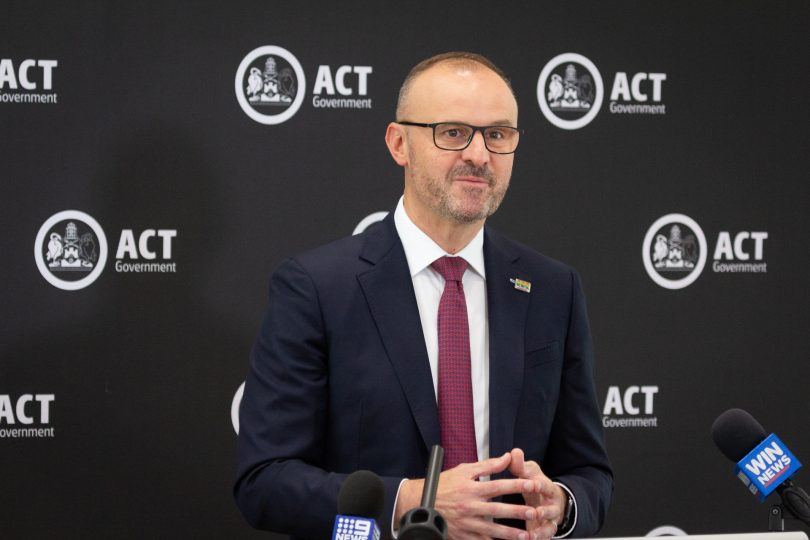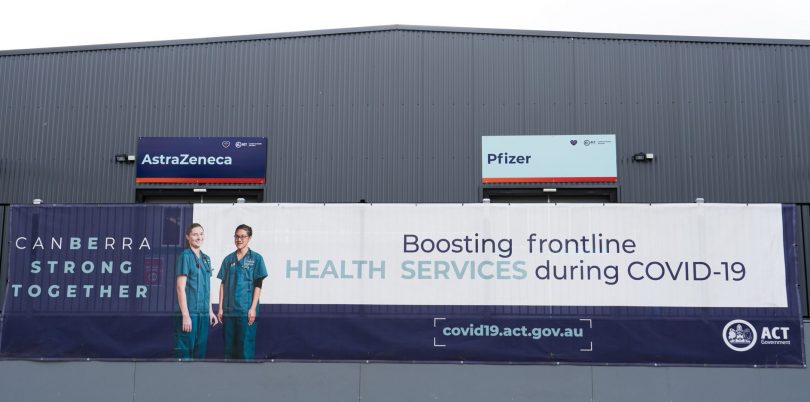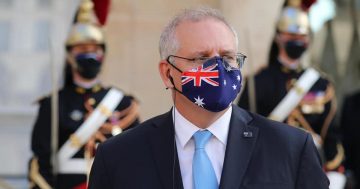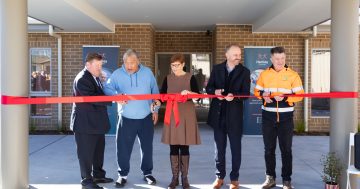
Chief Minister Andrew Barr said the ACT was well placed to pivot to a home quarantine regime for returning residents. Photo: Dominic Giannini.
Only a few hundred ACT residents remain stranded overseas, Chief Minister Andrew Barr confirmed on advice from the Department of Foreign Affairs and Trade (DFAT), meaning a home quarantine program would be viable for the Territory.
The relatively small number of ACT residents would enable ACT Health to accommodate repatriated Territorians in their own homes instead of the currently mandated two weeks of hotel quarantine, Mr Barr said.
More than 36,000 Australians remain overseas and have registered with DFAT to return home.
Mr Barr said the ACT was better placed than most other jurisdictions to implement home quarantines, which was flagged for vaccinated Australians by Prime Minister Scott Morrison last week, because of its uniqueness as a city-state.
“That would work for us to return ACT residents who have a home to quarantine in. It would not work if we were taking residents from other states and territories,” he said.
“We have been doing [home quarantine] throughout the pandemic. In fact, this has been the predominance of our [quarantine program].
Around 80 per cent of the ACT’s quarantine for returned travellers has been conducted at homes due to the high percentage of diplomats and Commonwealth officials arriving in Canberra.
When speaking on the possible change to the current quarantine regime last week, Mr Morrison said state and territory leaders would be provided advice on the proposal at the next National Cabinet meeting, scheduled for today (19 April).
No timeline has been attached to the proposal.
National Cabinet will also discuss the ramp-up of Australia’s vaccine rollout, with the Commonwealth Government pivoting to a mass vaccination strategy.
Mr Barr said that the infrastructure for the mass administration of vaccines was already in place in the ACT but that the rollout was contingent on the steady supply of doses from the Commonwealth.

Both AstraZeneca and Pfizer vaccines are being rolled out from the Garran Surge Centre opposite Canberra Hospital. Photo: Dominic Giannini.
“Arguably, we already have [mass vaccination centres] through the Garran Surge Centre, and we have plans to expand at Calvary on the northside as well,” he said ahead of today’s meeting.
“The question will be, how mass is mass? And whether we will need to go even bigger than that. We will look at those options.
“It is clearly limited by vaccine supply. There is no point setting up a massive centre if you do not have enough vaccines.”
The Garran centre can administer around 6000 vaccines a week and the Calvary centre will be able to administer 1700 in the same timeframe once operational at the end of April.
But Mr Barr said current reporting suggested that a larger volume of Pfizer vaccines was likely six months away, complicating the pace of the rollout.
The Commonwealth Government announced it would be purchasing an additional 20 million doses of the Pfizer vaccine – bringing Australia’s total to 40 million – following advice that people under-50 be administered the Pfizer jab instead of the AstraZeneca shot due to the remote risk of blood clotting.
Three cases of blood clotting likely resulting from the AstraZeneca vaccine have been recorded in Australia, according to the Therapeutic Goods Administration. The risk of blood clotting from the vaccine sits at around four to six people per million, according to Australia’s Chief Medical Officer, Dr Paul Kelly.
Mr Barr said the Commonwealth was clear that it wanted to continue administering vaccines through general practitioners and pharmacies, which administer the AstraZeneca vaccine due to the less stringent storage requirements.
Before the revelations of blood clots and issues with vaccine supply, the ACT Government was tasked with vaccinating around a third of its population while the Commonwealth would take point on the remaining two-thirds.
Mr Barr said this could now be subject to change following National Cabinet deliberations in light of the updated rollout advice.
National Cabinet is now scheduled to meet twice a week but Mr Barr said the quality of deliberations was more important than the frequency.
“Sometimes too many meetings can mean that you are getting rushed advice, you do not have time to read and absorb it properly, and you do not make the best decisions,” he said.
“I do not want to see this rushed. We have to get this right and if that means taking a few extra days between meetings to get the best possible information to lead to the best possible decision, [then] that is the best way forward.”
For advice on the vaccine’s rollout in the ACT, visit www.covid19.act.gov.au/vaccine.















